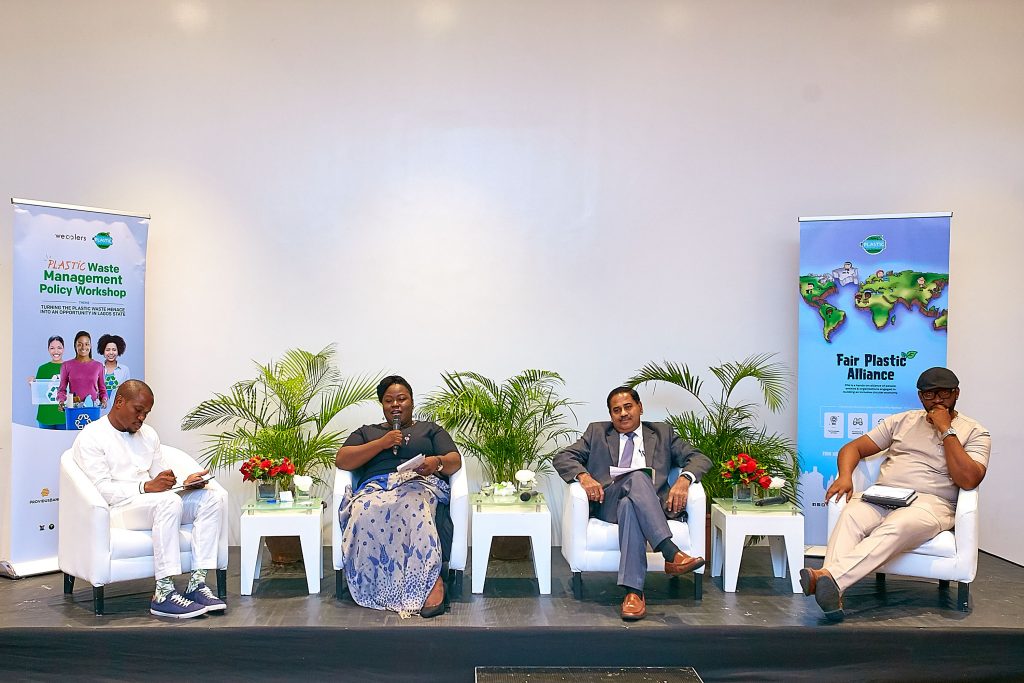LAGOS, Oct. 1 2019 — For sustainable solutions to unleash the positive potential of plastic waste in Lagos, policymakers must take into account the dramatic impact climate change is going to have.
Wecyclers and Fair Plastic Alliance Nigeria in partnership with The Lagos Waste Management Authority and The Lagos State Ministry of the Environment hosted the first Plastic Waste Management Policy Workshop in line with the Lagos State Governor’s T.H.E.M.E.S Agenda.
This workshop had as its key objective developing a set of procedures and goals, to be used in negotiation and decision making to guide a more detailed set of policies for plastic waste management in the state.
With several environmental professionals and scientists in attendance, there were all unanimous in the call over the menace of plastic waste and dangers poses to the aquatic wildlife, the environment, sustainable food production systems and ultimately, the human life. The workshop partcipants called for exploring available science and technologies, more research and development efforts on not only recycling but also the development of more environment-friendly biodegradable alternatives to plastic bottles.
Wecyclers CEO, Olawale Adebiyi in his remark shared that attaching a price value to recyclable plastics would encourage individuals, households and groups to keep their plastic waste properly, sell such to recycling companies is a key way to incentivize and encourage people which in turn will change mindsets and free the environment of recyclable waste deposits to a very large extent.
Similarly, Mr Oluwadamilola Emmanuel, General Manager, Lagos State Waterways Authority (LASWA), said the waterways in the state are loaded with undesirable materials that threaten the aquatic wildlife. The population and the metro lifestyles that encourage consumption of bottled water, soft drinks and other plastic packaging materials have increased the volume of plastic waste deposited in the waterways, he explained.
On the other hand, The Lagos State Government revealed plans to coordinate the waste management system in the state.
An Assistant Director from the Environmental Services Department, Ministry of the Environment and Water Resources, Mrs Tolulope Adeyo, speaking at the workshop said the government would rebrand resource managers (scavengers) and assign them areas across the state to assist in the waste sorting process.
On her part, Founder, Wecyclers, Mrs Bilikiss Adebiyi-Abiola, also admitted that apart from effects on the aquatic wildlife, the environment is deprived of necessary vegetation as the plastic materials on land retard proper vegetation. This, in turn, would affect farming, resilience building against climate change, and the need to beautify the environment for ecotourism.
Apart from recycling for bottle production, other products, as explained by BASF West Africa’s Director Dr Akintayo Adisa, is oil extract. He explained that because PET bottles are made from petroleum products, they could be recycled into oil that could serve various industry purposes using applied chemistry principles.
Dr Adisa disclosed that his organisition was moving to encourage individuals, households and groups to see plastic as a danger to the water body and earth surface, and hence should take advantage of getting empowered by disposing plastic waste responsibly.
In his closing remark, The Chief Executive Officer of Wecyclers Nigeria Limited, Mr Olawale Adebiyi, called on the state government to develop policies that would encourage waste recycling and guarantee the sustainability of the management of plastic wastes in Lagos.
He said favourable government policies could attract both local and foreign investors in the management of the tons of wastes generated in Lagos State on a daily basis.
“We have already started seeing the effect of our bad disposal attitudes around us, the most noticeable of these is flooding, and this is why we at Wecyclers want to address this growing trend while also empowering some individuals involved in the value chain like those who are involved from the point of waste collection. We go as far as offering incentives to these individuals,” he said.
As a way forward, he suggested state and federal inter-agency collaboration to clean the waterways and preserve the aquatic environment and wildlife. The collaboration with recyclers, producers of plastic materials and other government agencies, he argued, would make the state and Nigeria as a whole clean of plastic deposits in the waterways.
Polyethylene terephthalate (PET) bottles and other plastic materials are not biodegradable. They remain un-degraded for over 200 years, thereby constituting a threat to soil fertility, environmental purity. They contaminate water bodies and escalate extinction of aquatic biodiversity.
Lagos State is described as the smallest in land mass but arguably the largest in population, is said to generate at least 13,000 metric tonnes of waste daily, and over 60 per cent of the waste is plastic, as disclosed by the Lagos State government agencies. However, the value of Lagos State plastic waste daily, by implication, is around N97.5 billion, apart from the waste flushed into the waterways and the oceans.
Hi-res imagery and other press assets available in the media kit via the link below:
ABOUT WECYCLERS:
Wecyclers is a for-profit social enterprise that promotes environmental sustainability, socioeconomic development, and community health by providing convenient recycling services in densely populated urban neighborhoods. Visit www.wecyclers.com to learn more.
MEDIA CONTACT:
founders@wecyclers.com

